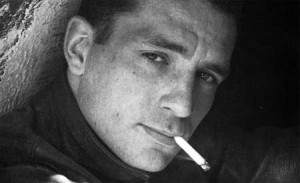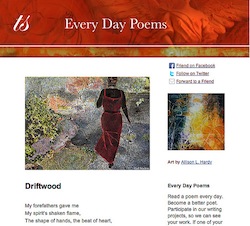He is born in 1922 to French Canadian parents in Massachusetts. For the next seven years, he speaks only French. His Roman Catholic faith shapes him; it does so for the rest of his life.
As a child, he writes: a newspaper, a diary, radio plays, even a novel.
He plays football in high school, and plays well. He’s offered a football scholarship to Columbia University in New York City. New York inspires.
World War II begins. He becomes deeply concerned by the shift in morals happening around him. He leaves college, joins the Merchant Marine. He writes a novel called The Sea is My Brother that won’t be published for 70 years, long after his death.
He returns to Columbia; he leaves again, this time for the Navy. He lands in a psychiatric unit; he is discharged. He returns to New York, but not to Columbia. He begins to meet with other writers. He already knows Allen Ginsberg. William Burroughs introduces him to philosophers and drugs. What becomes the Beat Generation – he names it – is forming and coalescing.
His father dies. He turns to a new writing project. It becomes The Town and the City, a fictionalized autobiography. He meets Neil Cassady. Their intense friendship becomes the heart of the most famous road trip account in modern American literature: On the Road.

His poetry is spontaneous, too. And confessional. He says it is “a kind of new-old Zen Lunacy poetry, writing whatever comes into your head as it comes, poetry returned to its origin, in the bardic child, Truly ORAL…instead of gray faced Academic quibbling. Poetry & prose have for long time fallen into the false hands of the false.” His example of gray faced Academic quibbling: T.S. Eliot.
No longer: “These new pure poets confess forth for the sheer joy of confession. They are CHILDREN. They are also childlike graybeard Homers singing in the street. They SING, they SWING…”
He names them: Ginsberg, Rexroth, Ferlinghetti, McCLure, Corso, Gary Snyder, Philip Lamantia, Philip Whalen, himself.
He writes this poem. Instructions: read aloud.
Hymn (1959)
And when you showed me Brooklyn Bridge
in the morning,
Ah God,
And the people slipping on ice in the street,
twice,
twice,
two different people
came over, goin to work,
so earnest and tryful,
clutching their pitiful
morning Daily News
slip on the ice & fall
both inside 5 minutes
and I cried I cried
That’s when you taught me tears, Ah
God in the morning,
Ah thee
And me leaning in the lamppost wiping
eyes,
eyes,
nobody’s know I’d cried
or woulda cared anyway
but O I saw my father
and my grandfather’s mother
and the long lines of chairs
and tear-sitters and dead
Ah me, I knew God You
had better plans than that
So whatever plan you have for me
Splitter of majesty
Make it short
brief
Make it snappy
bring me home to the Eternal Mother
today
At your service anyway,
(and until)
(from Scattered Poems by Jack Kerouac, City Lights Books)
The Beats converge on San Francisco as home base. He studies Buddhism. He writes more novels, published as paperbacks. He Americanizes haiku.
He dies in 1969. His widow seals his papers. When she dies, the archive opens.
He becomes a legend. An American legend.
He is Jack Kerouac.
On Tuesdays in the month of September, we’re featuring a series on the Beat poets. On Sept. 2, we had an introduction. Today is Jack Kerouac. On Sept. 16, it will be Allen Ginsberg, followed by Denise Levertov on Sept. 23 and Frank O’Hara on Sept. 30.
More reading on Jack Kerouac:
Naked Angels: The Lives and Literature of the Beat Generation by John Tytell (2006)
Atop an Underwood: Early Stories and Other Writings, by Jack Kerouac (2000)
Door Wide Open: A Beat Love Affair in Letters, 1957-1958, by Joyce Johnson (2001). Johnson also published a biography of Kerouac in 2012: The Voice is All: The Lonely Victory of Jack Kerouac.
Selected Letters Vol 1., 1940-1956 (1996) and Selected Letters Vol. 2, 1957-1969 (2000) by Jack Kerouac
Kerouac: A Biography, by Ann Charters and Allen Ginsberg (1994)
Memory Babe: A Critical Biography of Jack Kerouac, by Gerald Nicosia (2001)
Poetry: Scattered Poems, Book of Haikus, The Scripture of the Golden Eternity, Mexico City Blues: 242 Choruses.
Photo by Berenice Decados, Creative Commons via Flickr. Post by Glynn Young, author of the novels Dancing Priest and A Light Shining, and Poetry at Work.
Want to brighten your morning coffee?
Subscribe to Every Day Poems and find some beauty in your inbox.
- Longfellow’s “Paul Revere’s Ride”: Creating a National Legend - April 17, 2025
- Poets and Poems: Katie Kalisz and “Flu Season” - April 15, 2025
- Poets and Poems: Michelle Ortega and “When You Ask Me, Why Paris?” - April 10, 2025

L. L. Barkat says
I love the way you wrote this, Glynn. Almost as if it is a “beat” of its own.
Makes me want to know more about him, about how he lived, and died. The drugs part makes me sad; I never like it when someone gives his brain over to exterior substances, but perhaps some would argue that all of us are, in fact, given over to exterior substances of various kinds. Still. It makes me sad.
I wonder if, at the time, he had any understanding of how much he would influence a generation.
Glynn says
What I read of his life, and the poems that I read, seemed to require this kin of present-tense immediacy. I don’t usually write like this, but it seemed to fit.
Maureen Doallas says
Another in a wonderful series, Glynn.
“Zen Lunacy” is such a great phrase, and probably only one of the Beats could get away with it.
The first line of ‘Hymn’ is so wonderful, the whole poem is, because it’s profound in its simplicity and musical. And take a new look at the word usage: “tryful”, “tear-sitters”, “splitter of Majesty”. I also am drawn to “Make it snappy….”
Glynn says
“Zen” and “lunacy” seem contradictory, and that was the point, I think, the lunacy that came from a calm, zen-like center. Kerouac studied Buddhism for a time,and it influenced his writing and poetry. And oddly enough, he was also strongly influenced by his childhood faith, Roman Catholicism.
SimplyDarlene says
I agree with L.L. – this piece intrigues me to know more. Glynn (or anyone), what is your favorite piece of his and/or favorite piece about him?
Thanks for all the effort you put into research and writing and linking. From what you’ve shared, If he’d had groupies, I’d have probably been one. 😉
Glynn says
The Everyman Library has a small volume called “Beat Poets,” and it included the poet I have in the article, “Hymn.” I also liked “On the Road” but it’s been years since I read it.
SimplyDarlene says
Thanks! As I looked in our small-town library system for these, I found the latter and one called “Poets on the Peaks” by John Suiter:
“With Poets on the Peaks, writer-photographer John Suiter has created a literary portrait of Gary Snyder, Philip Whalen, and Jack Kerouac centered around their experiences as fire lookouts in the early 1950s.”
Marcy Terwilliger says
The article read like front page news back in the sixties, caught your attention, reeled you in, you read every word. He died the year I graduated from High School, some dates stick with you. I like the poem he wrote, especially “Ah me, I knew God You had better make plans for that. He’s telling God he wants to die fast, don’t we all.
Glynn says
That was the year I graduated from high school, too. It was a crazy time — the Free Speech movement may have unknowingly taken Kerouac and Ginsberg into the streets.
Marcy Terwilliger says
Glynn, we are having our 45th Reunion Sept.20th, it’s an all day affair on church property not far from home. They can’t drink on church property. My husband hates these things so I’m flying solo. It’s been too hot to look in either attic but I’ve got to find my yearbook.
Megan Willome says
Oh, my gosh, I love that poem! Especially the end.
Diana Bridgman says
It was hard to discern where the Kerouac poem begins, and where the Young writing ends. Even as we long for the next and glorious life, don’t we also cling fiercely to this one?
Thank you for this introduction, Glynn. Rich reading for today.
Glynn says
Diana – thanks for reading the post.